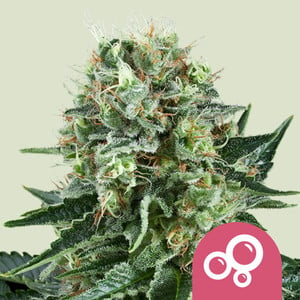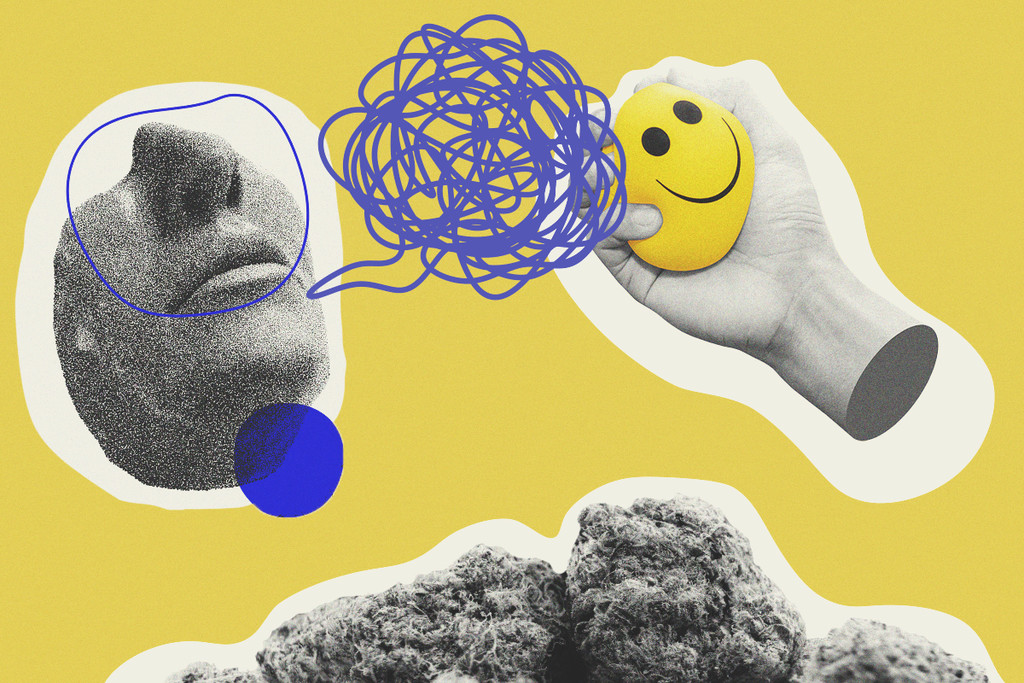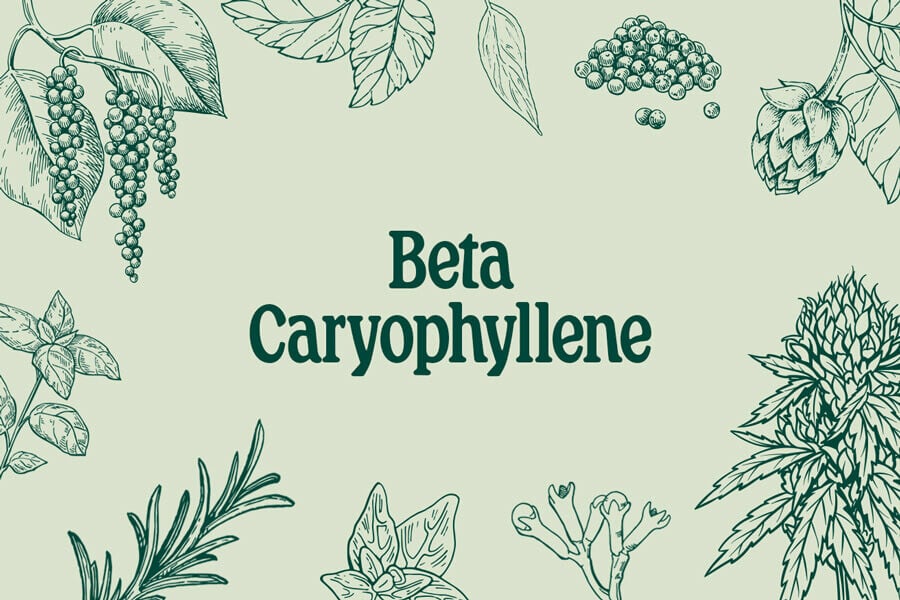.

Can Cannabis Help With Depression?
THC and CBD are the most well-known molecules produced by the plant, and both are being subjected to huge amounts of research on their relationship to anxiety and depression.
Contents:
Depression is a widespread mental health condition that affects approximately 19.2 million adults within the United States. In Europe, approximately 4.6% of the population suffers from depression or anxiety[1]. In some people, depression can come and go. In others, the condition is a permanent companion that can significantly reduce one's quality of life. Depression draws billions of euros from the economy each year and robs individuals of their potential happiness. Conventional treatments for the condition include a range of medications that work in some cases, but are not exempt from side effects. Interestingly, some people who experience depression turn to cannabis. Researchers are certainly interested in the potential of the herb for an array of conditions, but could it help with depression?
WHAT IS DEPRESSION AND WHAT CAUSES IT?
We all get a little sad from time to time. Stress, anxiety, and emotional life events can leave us feeling down in the dumps. Eventually, this sadness lifts and enables us to continue living our lives undisturbed. But depression is more than sadness. It’s a chronic mental health condition that can linger for months or years on end. Sufferers aren't able to simply “snap out of it”.
POTENTIAL TRIGGERS FOR DEPRESSION
The cause(s) of depression is a complex subject. The condition can stem from a distressing life event such as the death of a loved one, a severe illness, or social/work disorders. For others, it might be the accumulation of minor events that sends them on a downward spiral. The risk of depression is enhanced if people take certain drugs and alcohol in an attempt to self-medicate.
In other cases, depression can come about for no apparent reason at all. Biological factors and personality type can play a role. One explanation for depression is a lack of neurotransmitters such as serotonin. Research has also discovered that the hippocampus—an area of the brain involved in learning and memory—is smaller in some depressed people[2]. This could be down to stress suppressing the production of new neurons.
COMMON SYMPTOMS OF DEPRESSION
Depression can manifest in many different ways. Sometimes the signs can be mild, and other times quite severe. Common symptoms of depression include:
• Continuous low mood or sadness
• Lack of motivation and apathy
• Low self-esteem
• Insomnia
• Restlessness
• Difficulty concentrating
• Overeating or appetite loss
• Persistent aches and pains
• Feelings of hopelessness
• Feeling tearful and crying often
• Feeling irritable and intolerant
• No enjoyment of life
• Suicidal thoughts
TREATMENT FOR DEPRESSION
Multiple treatment options exist for depression. Each one is recommended individually based on the severity and specific characteristics of the condition.
Doctors may prescribe non-drug treatments for depression, suggesting things like psychotherapy and exercise to boost mood. Interestingly, aerobic exercise may increase endogenous cannabinoids that are responsible, together with other substances, for the so-called “runner’s high”[3]. Many depressed individuals can also benefit from cognitive behavioural therapy (CBT) to change patterns of thought and behaviour.
Doctors can also prescribe antidepressants in other cases. There are over 30 different types of antidepressants available, including selective serotonin reuptake inhibitors (SSRIs).
SSRIs increase levels of the neurotransmitter serotonin. They limit the reabsorption of serotonin into the presynaptic neuron, making more of the substance available. These medications are effective at stabilising mood in some patients, however, sometimes they are associated with side effects including nausea, nervousness, dizziness, sexual problems, weight gain, and insomnia.
These options help some people deal with and even overcome depression. In others, they fail to offer relief. Today, some people are exploring other options, including cannabis.
CANNABIS, DEPRESSION, AND THE ENDOCANNABINOID SYSTEM
If you smoke weed, you’re probably familiar with how it can make you feel. There are times when hitting a bong can initiate a fit of giggles. Some strains induce a heady buzz that lasts for hours, while others are more gentle and better suited to the serenity of the evening. However, there’s probably been other times when smoking weed has caused you to experience feelings of anxiety or even panic.
Because cannabis can have very different effects on people, it’s not guaranteed to improve a person’s mood.
Research is still exploring the effect of cannabis on depression. Before we delve into the studies, it’s important to make a few distinctions. As different strains contain different concentrations of cannabinoids and terpenes, they can have vastly different effects on mood.
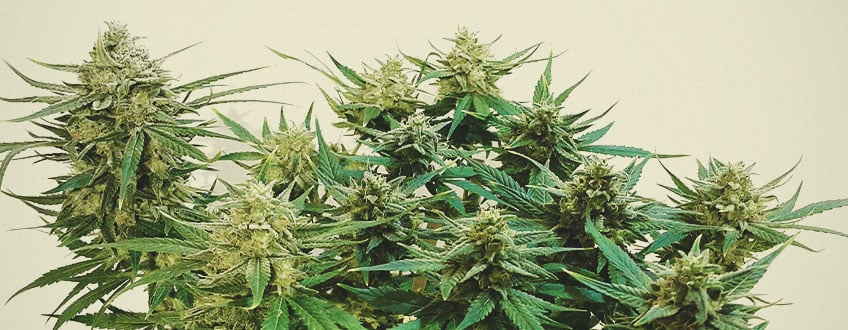
Bubble Kush
|
|
Bubble Gum x O.G. Kush |
|
|
550 - 600 gr/m2 |
|
|
80 - 140 cm |
|
|
55 - 65 days |
|
|
THC: Up to 19% |
|
|
Sativa 20% Indica 80% |
|
|
600 - 650 gr/plant |
|
|
160 - 200 cm |
|
|
Late September |
|
|
Clear, Physically Relaxing, Stoned |
WHAT THE RESEARCH SAYS
Unfortunately, comprehensive research in this area is lacking. So far, we have a shallow idea of these complex mechanisms. However, science has developed a greater understanding of how THC and CBD individually might affect mood.
When looking at the effects of these chemicals on the brain, it’s helpful to have an understanding of the endocannabinoid system (ECS). “Endo” means within, and “cannabinoid” refers to chemicals that influence receptors of the ECS. The ECS is made up of a series of receptors found on numerous cell types throughout the body. So far, science has confirmed two of these receptors—CB1 and CB2.
The ECS is also made up of specialised neurotransmitters that bind to these receptor sites and modulate the system. These molecules are known as endocannabinoids, namely anandamide and 2-AG. As it happens, molecules from the cannabis plant can influence the same receptors thanks to their similar shape. Cannabinoids from cannabis—and other plant species—are known as phytocannabinoids.
Both anandamide and 2-AG play a key role in the dopaminergic system, and therefore, in the regulation[4] of mood. Both of these molecules bind to CB1 receptors[5] on certain neurons and stimulate dopamine release.
THC (tetrahydrocannabinol) is one of the main constituents of modern cannabis cultivars. The molecule produces psychotropic effects by binding to CB1 receptors in the central nervous system. The cannabinoid may take the edge off depression in the short-term by increasing dopaminergic cell firing[6]. Consequently, neurons produce and release increased amounts of dopamine. This may result in improved mood and feelings of motivation.
Research published in the Journal of Affective Disorders found that cannabis significantly reduced rates of depression, anxiety, and stress. Researchers gathered data from the app Strainprint to examine the effects of certain strains on depression, anxiety, and stress[7]. The data showed that cannabis users perceived a 50% reduction in depression and a 58% reduction in anxiety and stress after using cannabis.
THC isn’t the only cannabinoid that might help with depression. The study found that strains high in CBD and low in THC were more associated with the largest changes in depression ratings. In contrast, strains high in THC and low in CBD produced the largest perceived changes in stress.
CBD and Depression
Cannabis scientists are trying to figure out how CBD impacts the mood, the central nervous system, and neurotransmission. So far, they’ve discovered some interesting mechanisms, including the cannabinoid’s proposed ability to “hack” the ECS.
Studies are currently analysing the influence of CBD on circulating endocannabinoids and how it works to temporarily disable enzymes[8] responsible for their degradation. Researchers are particularly interested in investigating how the cannabinoid interacts with fatty acid amide hydrolase (FAAH). This enzyme breaks down anandamide[9] (the “bliss molecule”), the brain chemical associated with positive psychological implications associated with the “runner’s high”.
In their search for cellular targets, researchers have also observed an interaction between CBD and serotonin receptors. You’ve probably heard of serotonin, or the “happy hormone”. This neurotransmitter stabilises mood and contributes to feelings of well-being; low levels of the hormone are also associated with depression. Upon determining CBD’s potential to activate serotonin receptors[10] in vitro (outside of a living organism), researchers are keen to find out how it works in animals.
Research in this area continues to unfold. A comparative study published in the British Journal of Pharmacology tested CBD in a mouse model of depression[11], comparing its effects against the tricyclic antidepressant imipramine. Further research, published in Neuropharmacology, set out to assess the impact of CBD[12] on serotonin and glutamate (the excitatory neurotransmitter) in mice.
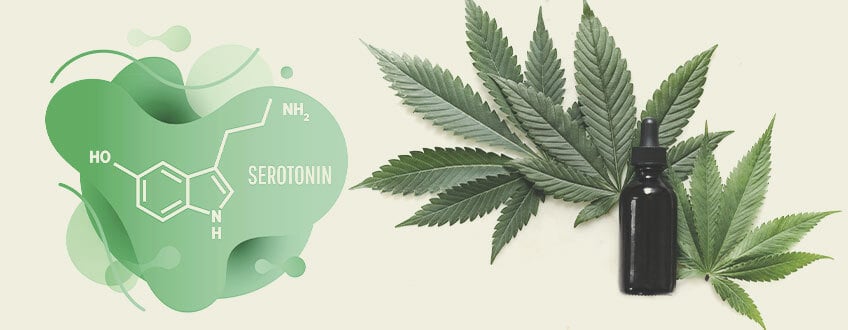
CBD and Seasonal Affective Disorder (SAD)
While there's no specific research into CBD and SAD, there is research relating to CBD and many of the symptoms of SAD. Below, we'll investigate a couple of studies which indicate that CBD might at least help to alleviate certain effects of seasonal affective disorder.
A 2011 paper tested the effects of CBD[13] in cases of generalised social anxiety disorder. Subjects underwent a simulated public speaking event after orally taking either 400mg CBD or a placebo. This study marks a significant milestone for CBD and anxiety research in humans. But much more investigation is needed before conclusions can be made.
Researchers from Colorado are also starting to look into the relationship between CBD and sleep[14]. So far, they’ve tested CBD oil in cases of anxiety and insomnia associated with post-traumatic stress disorder.
CBD might be able to assist in managing cases of SAD, but too little specific research exists to draw any conclusions.
CANNABIS AND DEPRESSION: A COMPLEX RELATIONSHIP
Although there’s research to suggest that cannabis may help with depression, some data suggests the opposite. Although acute exposure to THC can boost dopamine release, chronic exposure may blunt the dopaminergic system. Long-term cannabis use may decrease the brain's response to dopamine and possibly lead to reduced feelings of reward and motivation.
As stated, cannabis isn't just THC. CBD has displayed positive effects in regards to depression. Plus, researchers have yet to study over 100 other cannabinoids in this domain. The most sensible course of action is to discuss the matter with your healthcare professional. If you feel cannabis could be an appropriate option for you, check out these strains that might soothe some symptoms.
- https://web.archive.org/web/20240101151608/https://apps.who.int/iris/bitstream/handle/10665/254610/WHO-MSD-MER-2017.2-eng.pdf
- Late-Life Depression, Hippocampal Volumes, and Hypothalamic-Pituitary-Adrenal Axis Regulation: A Systematic Review and Meta-analysis https://web.archive.org
- https://web.archive.org/web/20240101151608/https://jeb.biologists.org/content/215/8/1331?sid%3D739917de-aaf2-469d-9f3a-ab04329720b7=
- The mesolimbic dopamine reward circuit in depression - PubMed https://web.archive.org
- Reversal of dopamine D(2) receptor responses by an anandamide transport inhibitor https://web.archive.org
- The effects of Δ9-tetrahydrocannabinol on the dopamine system | Nature https://web.archive.org
- A naturalistic examination of the perceived effects of cannabis on negative affect - ScienceDirect https://web.archive.org
- Cannabidiol enhances anandamide signaling and alleviates psychotic symptoms of schizophrenia - PMC https://www.ncbi.nlm.nih.gov
- Wired to run: exercise-induced endocannabinoid signaling in humans and cursorial mammals with implications for the ‘runner’s high’ | Journal of Experimental Biology | The Company of Biologists https://journals.biologists.com
- https://www.researchgate.net/profile/Ethan-Russo/publication/7507851_Agonistic_Properties_of_Cannabidiol_at_5-HT1a_Receptors/links/02e7e518a5fb6f1904000000/Agonistic-Properties-of-Cannabidiol-at-5-HT1a-Receptors.pdf
- Antidepressant-like effects of cannabidiol in mice: possible involvement of 5-HT1A receptors - PubMed https://pubmed.ncbi.nlm.nih.gov
- Cannabidiol induces rapid-acting antidepressant-like effects and enhances cortical 5-HT/glutamate neurotransmission: role of 5-HT1A receptors - PubMed https://pubmed.ncbi.nlm.nih.gov
- Neural basis of anxiolytic effects of cannabidiol (CBD) in generalized social anxiety disorder: a preliminary report - PubMed","//www.ncbi.nlm.nih.gov/pmc/articles/PMC5101100/ https://pubmed.ncbi.nlm.nih.gov



























